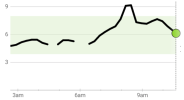Much more of our energy management is set up to deliver energy than to get rid of glucose. in the case of being cold (but not so cold that you are shivering) there is an increased demand from what is known as brown fat - these are fat storage cells that specialise in generating heat from subtle differences in the way that mitochondria work.
Cold - means more energy demand - means (absent any other change in the multitude of variables involved) more demand for blood glucose, if your system is primed to only burn glucose - if you are more fat adapted, this will also drive fat burning.
Any one person, doing nothing more than getting colder - to about 18°C can statistically show a rise in blood glucose because of this.
Any one person swimming in cold water, will trigger a demand for more energy, to deal with the fact that they are swimming, and thus the liver will generate that energy, usually in the form of available blood glucose (unless that person is more fat adapted, in which case there will be less effect on glucose and more fat will be mobilised).. Of course, as you continue swimming, that energy is expended, and you see the level drop.
Similar example - I went paddleboarding before breakfast..

The rise is entirely from my liver making more energy available, then dropping away. (breakfast about 9, for what it's worth)
Both things can be true - the body is really a wondrous machine.

